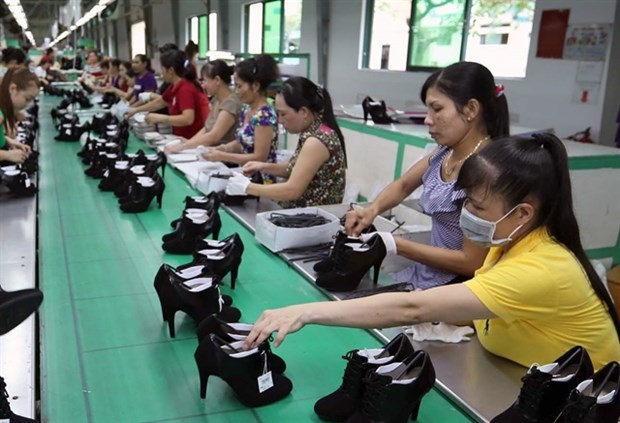 |
|
Workers make shoes at the Taiwan-invested My Phong Shoes and Leather Company in TraVinh Province.
|
Do Thuy Huong, a representative of the Vietnam Electronic Industry Association,said electronics was an industry that had applied advanced technologies.
“However, machines could not replace humans,” she said.
At some times, businesses needed labourers to work overtime, while there wereother periods employees had to be sent home due to a lack of orders, she said.
Huong suggested not limiting the number of overtime hours by week or month, butby year as a range of foreign direct investment (FDI) enterprises, accountingfor a large proportion of exports, had violated regulations on overtime hours.
Chu Van An, deputy head of Minh Phu Seafood Corporation, said the shrimp andfish sectors and agriculture in general were seasonal.
During the shrimp harvest season, if the factory received all local farmers’shrimp to process, it would violate regulations on overtime hours, he added,online newspaper Cafef.vn reported.
If a business violated regulations on overtime hours, partners would not buyits products, An said.
He also said businesses were not interested in letting labourers work overtime,because they had to pay 150-300 per cent extra for each overtime hour,depending on the overtime work on a normal day or holiday, while the price ofproducts that businesses sold to customers was fixed.
An said there were 3-5 months each year the shrimp sector needed labourers towork overtime, in other months, labourers even worked only five hours per day.
The corporation has four shrimp processing factories. To run the factories atfull capacity, they need about 20,000 labourers, however, they only have about13,000 labourers. Therefore, An suggested increasing to a maximum of 500overtime hours each year and not limiting overtime by month.
Bui Sy Loi, vice chairman of the National Assembly’s Committee for SocialAffairs, said the draft revised Labour Code has two options for overtime. Thefirst was to stick with current regulations – a maximum of 300 overtime hoursper year. The second option was to allow 400 overtime hours per year for fivespecial sectors, namely garments, textiles, seafood, leather shoes andelectronics.
Loi said he supported the option of increasing overtime hours to 400 each yearfor five special sectors. But it should be a voluntary agreement between theemployer and employees to ensure the health of labourers.
“In a country where labour productivity is not high, wages are rising fasterthan labour productivity, we need to calculate carefully,” he said.
This revised law also raised the question of creating a law to boost labourproductivity, he said.
Former deputy minister of Labour, Invalids and Social Affairs Nguyen Minh Huan saiddebates over overtime hour were not new and there were always two contraryopinions every time the law was revised.
This time, the draft suggested increasing overtime hours to 400 each year forsome special sectors. However, some National Assembly deputies did not agreewith, he said.
“It will cause difficulties for businesses because the characteristics of somesectors such as seafood and textiles are seasonal,” he said.
The revised Labour Code is expected to be voted on November 20 by NationalAssembly deputies./.VNA

Proposed weekly working hours attract mixed opinions
A new proposal for Labor Code amendments to reduce the standard working hours from 48 hours per week to 44 hours has been rejected for its lack of feasibility.

VN businesses oppose reduction of working hours
The business community has protested the Ministry of Labor, War Invalids and Social Affairs’ (MOLISA) intention to cut the weekly maximum working hours from 48 to 44 hours.
 Businesses and experts are still concerned over the impact on production of overtime hours that are not increased for seasonal jobs.
Businesses and experts are still concerned over the impact on production of overtime hours that are not increased for seasonal jobs.